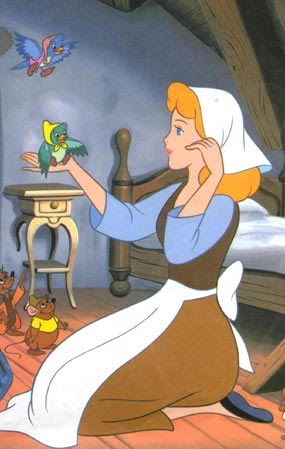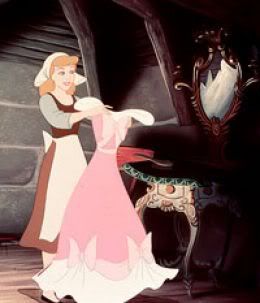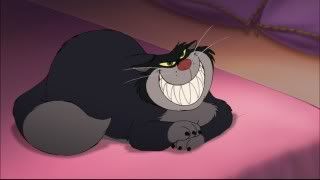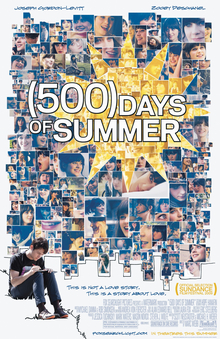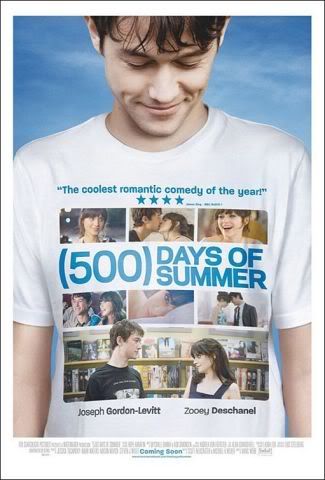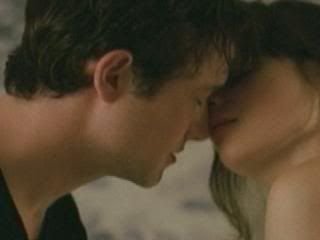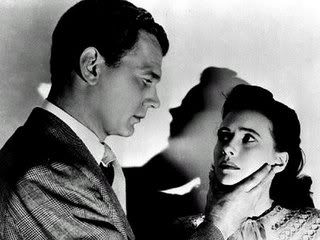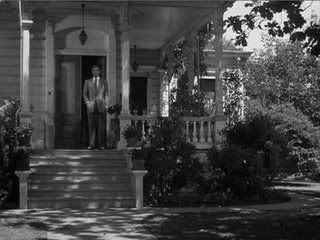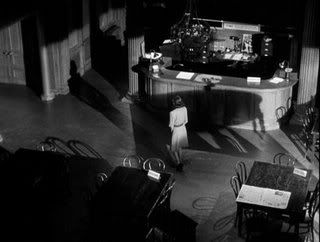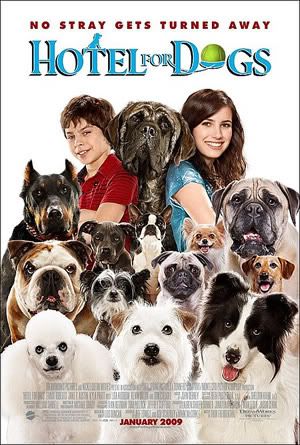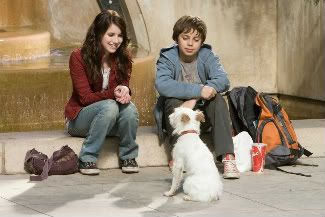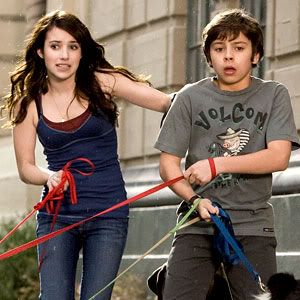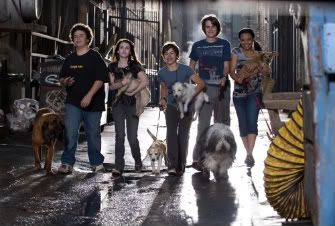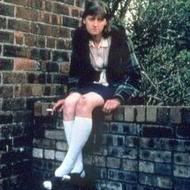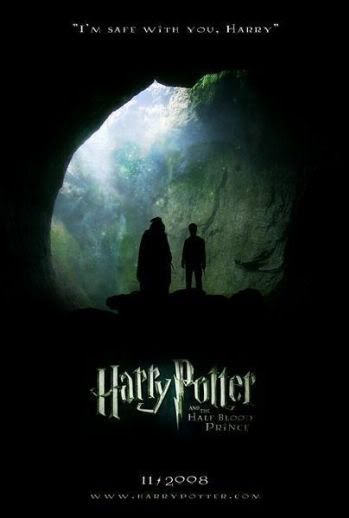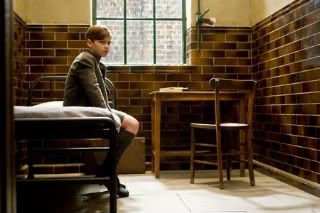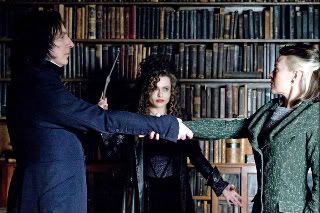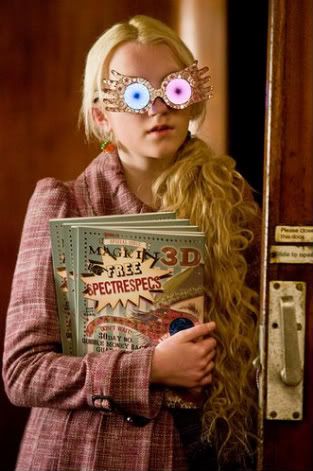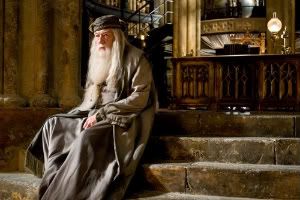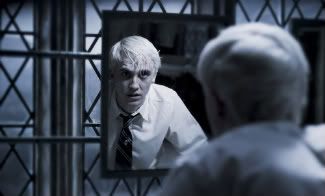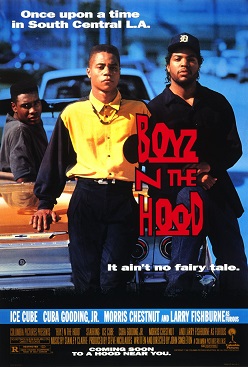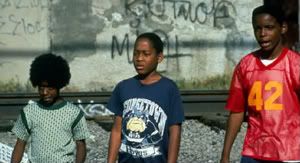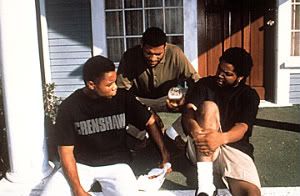While this blog has been geared exclusively toward film, I mentioned in the first ever post that it would cover the remaining cultural areas that I have not covered in my two other blogs. As such, I am not going to attempt to work up a weekly feature where I review one CD, new or old, each Monday. Hopefully this experiment will result in my gaining more exposure to music, both new and old. Next week I will likely discuss Cage's new CD, Depart From Me. Anyhow, let us begin with my first attempt at competently reviewing some music.
Hot off the heels of her debut album, Demi Lovato has returned with her follow up record Here We Go Again. While it seems irrational to expect that in just a short year's time that Demi would have grown immensely as an artist, her first album, Don't Forget, was still one of last year's best and certainly had me prepared for an album of at least equality quality. With the first album Demi showcased her vocal prowess as well as providing solid instrumentals that were complimented by lyrics which were a bit more edgy than other musical forays backed by the Disney logo, so even if she had only made minimal strides over the year, which this record clearly shows is not true and that Demi has grown a good deal in the short time, the record could potentially make for a great listen. Still, after being skeptical of the first released single I was slightly worried that I would not enjoy the record as much as I had initially hoped.
Here We Go Again - Fittingly, things start off with the single that I was at first skeptical of, and I'm really glad that the record chooses to put this song first because, after two or three listens, the song easily grew on me. Mixed with a constantly shifting instrumental structure that picks up and tones down on the fly, the intensity that Demi brings to the song is both admirable and impressive. In many ways this track sets the tone for the entire record and displays what seems to be Lovato's greatest strength: the ability to blend the loud intensity and quiet, soothing aspects of a song into one riveting piece of music.
Best lines: "We're falling together
You think that by now, I'd know
'Cause here we go, go, go again"
Solo - Beginning with an impressive vocal showing, "Solo" takes a few notes from the previous track and really builds itself around a prevalent theme that makes use of an interesting distinction between 'solo' and 'so low.' Not surprisingly, wikipedia lists this song as the first song on the album that Demi had a part in writing, so the fact that it is not as pop friendly and a bit deeper, both instrumentally and lyrically, is not overly surprising.
Best lines: "I fell through the hole
Down at the bottom of your soul"
U Got Nothin' On Me - First of all, I am not a fan of abbreviating 'you' to 'u.' Secondly, the song really rubs me the wrong way at the beginning when Demi comes out with an over produced shout of "You Got Nothin' On Me" repeating twice. But then Demi comes in and starts singing, and then the shout is worked in wonderfully with the chorus, and the heavy steady drum beat just blends with the words wonderfully, and the whole world is great. Demi really shows strength here as both a singer, though the whole record shows this, but also as a songstress. The occasional use of guitar, the heavy drums, and the way she uses the quick "me/I see" rhyme to keep the song flowing, it's pretty damn impressive. And then there's her signature quiet part. It took some time for me to warm up to it, but this is an early stand out track.
Best lines: "Goodbye to broken promises
Time to face your carelessness
Don't bore me with apologies
Or come back crawling on your knees"
Falling Over Me - Now for a change of pace, Lovato slows things down and keeps the subdued sound for the majority of the song. I am not a huge fan of the chorus, the male singer she has going on in the background really detracts from the perception of the personal element that the song attempts to hit. Thankfully, Demi doesn't share much time on the track and the back up occasionally works. Probably as a straight up technical vocalist this is the best showcase of her talent on the CD up to this point, but we already know she has a great voice. The song is enjoyable, but it is not one of my favorite tracks.
Best lines: "You're standing as a flower on a wall
The room is still, but we're about to fall
And all the names that brought us here
Simply fade away"
Quiet - Remember how I said that one of Demi's greatest strengths is her ability to switch from quiet to loud to quiet on the fly? Kind of like Pixies? Well think about a song that literally draws attention to her mastery of this technique and also works as a thematic song on the album. Basically the result is "Quiet," a thrill ride of sound prowess with enough catchy parts to make The Beatles, or any other overrated pop band, jealous. And the part where she mostly cuts instruments and then just builds. It's an amazing song and one of the record's best. Not to mention the up tempo and then cut out way it just ends. Incredible.
Best lines: "Don't stop, don't stop
Telling me goodnight
Just promise you'll kiss me goodbye
What's taking so long?
Don't tell me you're not gonna try
The tension's building in my mind
I wanna scream and I know why"
Catch Me - Wikipedia tells me this is the first and only song on the record penned exclusively by Ms. Lovato. On her previous CD the only track Wikipedia lists as such is "Trainwreck." If you take just these two songs and combine them, you have enough potential to basically assure that once the Disney muzzle comes off completely that Demi has more than enough talent to make one Hell of a record. The song uses some pretty simplistic metaphors along with the constant slow paced song that really displays Demi's impressive singing voice. Plus the use of violin or something is pretty cool, and despite being simplistic the metaphors and similes are pretty unique, so she is definitely developing as a song writer as well, which is great news for the future. Another great track in Demi's increasingly impressive library. And then there's that interesting thirty second up tempo part at the end which is kind of cool.
Best lines: "See, this heart
Won't settle down
Like a child running scared from a clown
I'm terrified of what you'll do"
Every Time You Lie - Starting off with a scratchy needle hitting a vinyl sound, Every Time You Lie is likely the most 'single friendly' song on the record for a while, but this quality is not bad as it ultimately proves to be one of the record's best tracks. The lyrical delivery is intense and occasionally mean, a quality reminiscent of the Bootleg Series version of Dylan's "Idiot Wind." Completely different sounds, obviously, but the same reserved cynicism. The song also possesses a quiet confidence to go along with this aspect, making it one of my personal favorites. The lyrics are mighty damn impressive as well, certainly not something I had expected to find on the record. Not to mention that short piano outro. Damn fine song.
Best lines: "I woke up the next morning
With a smile on my face
And a long list of gentlemen
Happy to take your place
Less trashier, much classier
Than who you prove to be
How long's it gonna take before
You see that she's no me?"
Got Dynamite - Demi quickly switches gears with the next track, the most overtly heavy rock inspired "Got Dynamite" track. The way sound is used here, both natural and touched up, is pretty impressive and both aspects work nicely alongside one another. The lyrics here are a little heavier as well and a bit darker than what the rest of the album has shown thus far. It lightens up a bit toward the end, but on the whole the song is probably the record's most interesting just because it is so unique when taken along with everything else. It's slightly sexual, it's kind of romantic, it's sort of light hearted, and yet it's oddly intense. Some people may have a problem with the song's all over nature, but I think it works excellently.
Best lines: "When the walls come crashing down
I hope you're standing right in front of me
Where my past lies all around
'Cause all you need to save me is to intervene
And make the walls come crashing down
Got, got dynamite?"
Stop the World - Starting off with the obvious theme of identity confusion in a teenager's life, really a universal quality, the song is mostly a standard love song that is a good deal more optimistic than previous tracks. Now I'm not usually one for optimistic things, songs or otherwise, but the song mostly works and proves to be a pretty good listen and certainly not out of place with the album's themes. Plus the song contains a few pretty great lines. I've also mostly given up on how Demi sings, she's a Hell of a vocalist, so I'll stop mentioning that and start concentrating more in depth with the songs. Just assume, from here on out, that she is singing great, unless I state otherwise.
Best lines: "Like Bonnie and Clyde
Let's find a ride and ditch this town
To keep it alive, keep it alive
Don't make a sound"
World of Chances - Apparently this song was co-written with John Mayer. I don't really know who he is, but apparently people say he's like Eric "Call Me Crapton" Clapton, which is not a good thing at all. Wikipedia also tells me that another song that he wrote for the album was left off entirely. I'll get back to that later. The chorus here is really nice and the song is another upbeat yet slow track. The lyrics are kind of pretty though, and Demi's voice really only enhances things because it is pretty soft and pronounced. The song is actually pretty liberating though and touches on a variety of themes, though nothing is completely fleshed out. It's a beautiful song to listen to and the saddened direction the song takes is pretty cool, plus it's not as overtly personal, making use of the third person, which is great because it should help cement Demi as a story teller as well as a songstress. Not one of my favorites, but still a good song.
Best lines: "Maybe you'll call me someday
Hear the operator say the number's no good
And that she had a world of chances for you"
Remember December - Talk about a change of pace though, Demi goes from subdued to high octane pseudo pop mixed with a bit of hard rock and some edgy stuff on "Remember December." I know I was not going to say anything else about how great of a singer she is, but this song once again shows just how great her range is, making for an even more compelling listen. Demi sings the song with a paradoxical fragile dominance that is pretty powerful, and the lyrical content plays to this pretty excellently. The themes here are both fleshed out nicely, presented in an interesting manner, and there's a cool little guitar solo that Demi eventually comes in over before cutting to another solo before going quiet. It's a high energy ride that is mighty impressive. Rock Band material, easily, though many of her songs are.
Best lines: "Just prove that there is nothing left to try
'Cause the truth, I'd rather we just both deny
You kissed me with those open eyes
It says so much, it's no surprise to you
But I've got something left inside"
Everything You're Not - So this song was apparently added amidst some controversy. It seems Demi wrote a song about her "relationship with her estranged father" entitled "For the Love of a Daughter" and another song called "Shut Up & Love Me," concerning material I do not know. In their place this song was replaced and, I'm not really sure what the CD qualifies them as, the next two tracks became additional bonus tracks. Anyway, the lyrical content is still pretty mature, and contains the record's most beautiful line, but the song is more open ended and can likely pass as a simple love song. Still, the song is mighty strong and very pretty, possessing a lyrical beauty that combines with a high energy up tempo chorus. It's also a pretty diabolical song at times, particularly the opening verse. All the verses are great though, the lyrics are definitely a huge strength here. A great way to start closing, or completely close, the album.
Best lines: "I used to sing to your twisted symphony
The words that had me
Trapped inside your misery"
and
"And I am done
With your twisted symphony
The words that had me
Sound like stolen poetry
I tore the pages and I can finally breathe"
Gift of a Friend - So this song is apparently the first of two bonus track, maybe. It's from Disney's Tinkerbell movie, and wikipedia says they are bonus tracks. My iTunes version does not label them as such, so until I also see a physical copy I cannot classify them as either. Not that it matters, bonus tracks are part of a record as any other tracks, especially when included on a record's standard edition. This song is pretty good as well. It's mighty straight forward and kind of uplifting. A little generic, and certainly not one of my favorites, but still enjoyable. The song is completely carried by Demi's voice though rather than the instruments or the lyrics.
Best lines: "And when your hope crashes down, shattering to the ground
You, you feel all alone
When you don't know which way to go
And there's no signs leading you home
You're not alone"
So Far, So Great - The title track from Lovato's Disney series Sonny With A Chance, "So Far, So Great," is an odd note to close on and really makes me wonder how it got on the record. Sure it's a great song, it's a Hell of a fun listen, but it thematically breaks from the rest of the album and undercuts the maturity that the record had established throughout. Incredibly pop oriented, the track is marked with an easy to swallow message and a great vocal performance from Demi despite it being an older song. While the album could have closed with a bang, and in many senses the track is an audible one, the track helps things go out thematically with a whimper. Still, a good song, just very out of place.
Best lines: "Everyone says
Don't get your hopes up
Learn the ropes
And climb the ladder"
So on the whole the follow up to Demi's stellar first album is not only an improvement in just about every possible way imaginable, but it also proves to be a beacon of shining hope for the young artist's future. Aside from being a talented vocalist, Demi seems to have the mind of a writer with a dark side that ought to add a good deal of value to her future projects. I look forward, immensely, to the time when she releases a record that is, from top to bottom, a product of her mind, but until then it seems that she continues to grow as an artist and is easily one of the brightest talents currently working today. Here We Go Again is nothing short of one of the year's best albums and a sign that the music industry, despite lacking in many areas, is still pushing some incredibly impressive talent on the masses.
As for a personal ranking of song preference, and this is tough because I do think all of the tracks are great, here is how I would rank things. I should also note that all comments about track listing, bonus track use, and what was cut and why toward the end of my recap is merely speculation coming from my conspiracy oriented mind, not fact.
14. Gift of a Friend
13. Falling Over Me
12. Stop the World
11. So Far, So Great
10. World of Chances
9. Here We Go Again
8. Solo
7. Everything You're Not
6. Got Dynamite
5. U Got Nothin' On Me
4. Remember December
3. Quiet
2. Catch Me
1. Every Time You Lie
You may be looking down here for a letter score or numeric value to sum things up, as I provide with my film reviews, but I do not feel one is needed. I break down each song shortly and I have been overwhelmingly positive. The CD is one of the year's best and a must own record, no score or easy to swallow number should be needed. For music reviews I shall not use a scoring system, I shall simply reflect, and the reader may draw conclusions from there. Next week I shall shift gears completely when I turn to Cage's third record, Depart From Me. Obviously the material will be much more overtly mature and I look forward to discussing that overlooked gem of a record as well.
Comments are welcome and, for anyone with a literary mind, I encourage checking out my poetry blog filled with all original works for your reading pleasure.
Also I am on the old Twitter thing so I guess you can follow me at twitter.com/FLYmeatwad.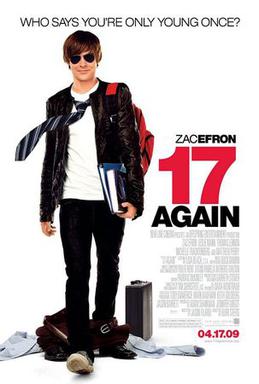
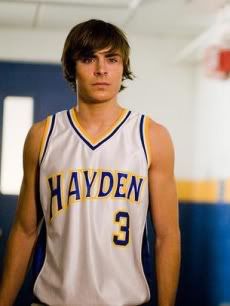 Thankfully, the film is anchored by a ton of interesting aspects that distance the film from obvious comparisons that are to be drawn. 17 Again is not another Freak Friday clone, it is not a High School Musical rip off, it is not the poor man's Mean Girls; 17 Again is a better film than any of those three could ever hope to be for a variety of reasons. However, the most noticeable reason for this film's success comes, surprisingly, in the form of Zac Efron. Not only does he convey an incredibly striking slick and collected demeanor during the majority of the film, a swagger of impressive ability, but the role asks that he be able to show a range of believable emotion that would challenge the most accomplished of actors. The fact that he handles the role with such care, humanity, and brilliance cements him as one of the year's best performers so far. To say that I was floored with what Efron does in the role is an understatement, he hits every note in the film pitch perfectly.
Thankfully, the film is anchored by a ton of interesting aspects that distance the film from obvious comparisons that are to be drawn. 17 Again is not another Freak Friday clone, it is not a High School Musical rip off, it is not the poor man's Mean Girls; 17 Again is a better film than any of those three could ever hope to be for a variety of reasons. However, the most noticeable reason for this film's success comes, surprisingly, in the form of Zac Efron. Not only does he convey an incredibly striking slick and collected demeanor during the majority of the film, a swagger of impressive ability, but the role asks that he be able to show a range of believable emotion that would challenge the most accomplished of actors. The fact that he handles the role with such care, humanity, and brilliance cements him as one of the year's best performers so far. To say that I was floored with what Efron does in the role is an understatement, he hits every note in the film pitch perfectly.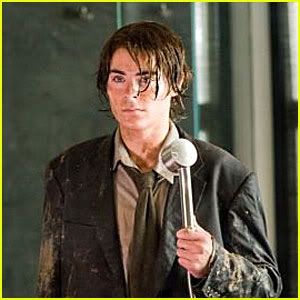 Of course the supporting cast all are pretty solid as well and help Efron transition seamlessly in and out of the straight man/funny man role depending on whom he interacts with at any point in the film. Leslie Mann is charming as Mike's wife, Scarlett, and she is likely the strongest of the supporting actors. Seeing Thomas Lennon, following up a small but funny bit in I Love You, Man, as the eccentric best friend Ned was great and just about all of his comedic parts hit. He is pretty hysterical in the film and has the most memorable lines.
Of course the supporting cast all are pretty solid as well and help Efron transition seamlessly in and out of the straight man/funny man role depending on whom he interacts with at any point in the film. Leslie Mann is charming as Mike's wife, Scarlett, and she is likely the strongest of the supporting actors. Seeing Thomas Lennon, following up a small but funny bit in I Love You, Man, as the eccentric best friend Ned was great and just about all of his comedic parts hit. He is pretty hysterical in the film and has the most memorable lines.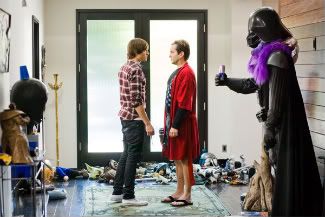 Well, at least in quantity because nothing beats Sterling Knight's "Yeah, I'd shake your hand, but it's taped to my ass," line. Actually, seeing Sterling Knight here kind of caught me off guard because he looks so different from how he looks in other recent works, despite this being a 2009 film. For those unaware, Knight is a co-star on Demi Lovato's Disney Channel series Sonny With A Chance where he plays the arrogant Chad Dylan Cooper, quite brilliantly I may add. Seeing Knight here in a completely different role, giving a Michael Cera~esque performance, shows that he is a versatile young actor and has me interested to see what else he does in the future. His performance here is slightly erratic, but seeing him branch out slightly is reassuring. However, the final major supporting cast member, Michelle Trachtenberg, looks pretty enough in her limited screen time to keep the viewer from noticing that she really does not do all that much, well aside from a funny quasi-incest scene.
Well, at least in quantity because nothing beats Sterling Knight's "Yeah, I'd shake your hand, but it's taped to my ass," line. Actually, seeing Sterling Knight here kind of caught me off guard because he looks so different from how he looks in other recent works, despite this being a 2009 film. For those unaware, Knight is a co-star on Demi Lovato's Disney Channel series Sonny With A Chance where he plays the arrogant Chad Dylan Cooper, quite brilliantly I may add. Seeing Knight here in a completely different role, giving a Michael Cera~esque performance, shows that he is a versatile young actor and has me interested to see what else he does in the future. His performance here is slightly erratic, but seeing him branch out slightly is reassuring. However, the final major supporting cast member, Michelle Trachtenberg, looks pretty enough in her limited screen time to keep the viewer from noticing that she really does not do all that much, well aside from a funny quasi-incest scene.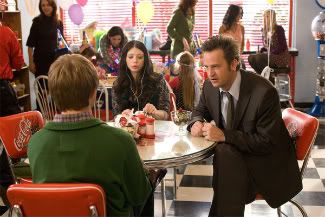 Speaking of humor, that aspect is another of the film's strong points. The comedic scope is broad, the previously mentioned scene also features Trachtenberg slightly breaking the fourth wall as she question's Mike's, and by extension addresses the questions about Efron's, sexuality in regard to his appearance. But the film also has a fair amount of slap stick, a ton of pop culture references, some witty one lines, and just generic jokes scattered about to keep the film fresh. Which is good because, aside from the acting and the script, the film does not have too much else going on to make the experience compelling. The direction, despite having a few really great shots, is standard and hardly distinctive. From a technical perspective the film falls flat. Still, the script and cast are strong enough to easily transcend this technical mediocrity, much like Hannah Montana: The Movie.
Speaking of humor, that aspect is another of the film's strong points. The comedic scope is broad, the previously mentioned scene also features Trachtenberg slightly breaking the fourth wall as she question's Mike's, and by extension addresses the questions about Efron's, sexuality in regard to his appearance. But the film also has a fair amount of slap stick, a ton of pop culture references, some witty one lines, and just generic jokes scattered about to keep the film fresh. Which is good because, aside from the acting and the script, the film does not have too much else going on to make the experience compelling. The direction, despite having a few really great shots, is standard and hardly distinctive. From a technical perspective the film falls flat. Still, the script and cast are strong enough to easily transcend this technical mediocrity, much like Hannah Montana: The Movie. In fact, 17 Again possesses many of the same charms that a film like Hannah Montana possesses*. Substitute Miley's music for Zac's dancing and dribbling, add in a bit more humor but less drama, and keep both film's standard in most technical aspects and, much like Hannah Montana: The Movie, 17 Again proves to be the high point of escapist entertainment. Marked by a surprisingly great performance by Zac Efron, 17 Again has to be one of my most overlooked films in recent memory, echoing a lot of things found in Mean Girls but lost upon my second viewing. I do think this film actually has enough to it that would allow it to hold up during a second viewing though, and I hope I am able to revisit 17 Again in the future. More proof that entertainment of this nature should not be needlessly dismissed and actually can provide a ton of entertainment to viewers of any age. The film also has put Efron on my radar of actors to keep an eye on in the future. I cannot believe I dismissed this film earlier in the year.
In fact, 17 Again possesses many of the same charms that a film like Hannah Montana possesses*. Substitute Miley's music for Zac's dancing and dribbling, add in a bit more humor but less drama, and keep both film's standard in most technical aspects and, much like Hannah Montana: The Movie, 17 Again proves to be the high point of escapist entertainment. Marked by a surprisingly great performance by Zac Efron, 17 Again has to be one of my most overlooked films in recent memory, echoing a lot of things found in Mean Girls but lost upon my second viewing. I do think this film actually has enough to it that would allow it to hold up during a second viewing though, and I hope I am able to revisit 17 Again in the future. More proof that entertainment of this nature should not be needlessly dismissed and actually can provide a ton of entertainment to viewers of any age. The film also has put Efron on my radar of actors to keep an eye on in the future. I cannot believe I dismissed this film earlier in the year.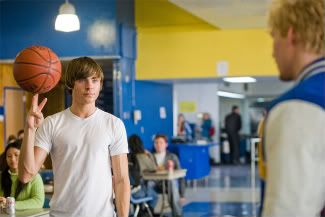 Comments are welcome and, for anyone with a literary mind, I encourage checking out my poetry blog filled with all original works for your reading pleasure.
Comments are welcome and, for anyone with a literary mind, I encourage checking out my poetry blog filled with all original works for your reading pleasure.
